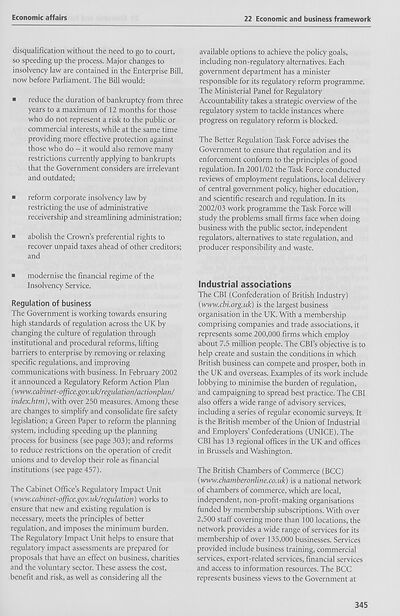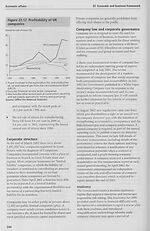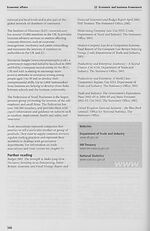Download files
Complete book:
Individual page:
Thumbnail gallery: Grid view | List view

Economic affairs
22 Economic and business framework
disqualification without the need to go to court,
so speeding up the process. Major changes to
insolvency law are contained in the Enterprise Bill,
now before Parliament. The Bill would:
■ reduce the duration of bankruptcy from three
years to a maximum of 12 months for those
who do not represent a risk to the public or
commercial interests, while at the same time
providing more effective protection against
those who do - it would also remove many
restrictions currently applying to bankrupts
that the Government considers are irrelevant
and outdated;
■ reform corporate insolvency law by
restricting the use of administrative
receivership and streamlining administration;
■ abolish the Crown’s preferential rights to
recover unpaid taxes ahead of other creditors;
and
■ modernise the financial regime of the
Insolvency Service.
Regulation of business
The Government is working towards ensuring
high standards of regulation across the UK by
changing the culture of regulation through
institutional and procedural reforms, lifting
barriers to enterprise by removing or relaxing
specific regulations, and improving
communications with business. In February 2002
it announced a Regulatory Reform Action Plan
(www.cabinet-ojfice.gov.uk/regulation/actionplan/
index.htm), with over 250 measures. Among these
are changes to simplify and consolidate fire safety
legislation; a Green Paper to reform the planning
system, including speeding up the planning
process for business (see page 303); and reforms
to reduce restrictions on the operation of credit
unions and to develop their role as financial
institutions (see page 457).
The Cabinet Office’s Regulatory Impact Unit
(www.cabinet-ojfice.gov.uk/regulation) works to
ensure that new and existing regulation is
necessary, meets the principles of better
regulation, and imposes the minimum burden.
The Regulatory Impact Unit helps to ensure that
regulatory impact assessments are prepared for
proposals that have an effect on business, charities
and the voluntary sector. These assess the cost,
benefit and risk, as well as considering all the
available options to achieve the policy goals,
including non-regulatory alternatives. Each
government department has a minister
responsible for its regulatory reform programme.
The Ministerial Panel for Regulatory
Accountability takes a strategic overview of the
regulatory system to tackle instances where
progress on regulatory reform is blocked.
The Better Regulation Task Force advises the
Government to ensure that regulation and its
enforcement conform to the principles of good
regulation. In 2001/02 the Task Force conducted
reviews of employment regulations, local delivery
of central government policy, higher education,
and scientific research and regulation. In its
2002/03 work programme the Task Force will
study the problems small firms face when doing
business with the public sector, independent
regulators, alternatives to state regulation, and
producer responsibility and waste.
Industrial associations
The CBI (Confederation of British Industry)
(www.cbi.org.uk) is the largest business
organisation in the UK. With a membership
comprising companies and trade associations, it
represents some 200,000 firms which employ
about 7.5 million people. The CBI’s objective is to
help create and sustain the conditions in which
British business can compete and prosper, both in
the UK and overseas. Examples of its work include
lobbying to minimise the burden of regulation,
and campaigning to spread best practice. The CBI
also offers a wide range of advisory services,
including a series of regular economic surveys. It
is the British member of the Union of Industrial
and Employers’ Confederations (UNICE). The
CBI has 13 regional offices in the UK and offices
in Brussels and Washington.
The British Chambers of Commerce (BCC)
(www.chamberonline.co.uk) is a national network
of chambers of commerce, which are local,
independent, non-profit-making organisations
funded by membership subscriptions. With over
2,500 staff covering more than 100 locations, the
network provides a wide range of services for its
membership of over 135,000 businesses. Services
provided include business training, commercial
services, export-related services, financial services
and access to information resources. The BCC
represents business views to the Government at
345
22 Economic and business framework
disqualification without the need to go to court,
so speeding up the process. Major changes to
insolvency law are contained in the Enterprise Bill,
now before Parliament. The Bill would:
■ reduce the duration of bankruptcy from three
years to a maximum of 12 months for those
who do not represent a risk to the public or
commercial interests, while at the same time
providing more effective protection against
those who do - it would also remove many
restrictions currently applying to bankrupts
that the Government considers are irrelevant
and outdated;
■ reform corporate insolvency law by
restricting the use of administrative
receivership and streamlining administration;
■ abolish the Crown’s preferential rights to
recover unpaid taxes ahead of other creditors;
and
■ modernise the financial regime of the
Insolvency Service.
Regulation of business
The Government is working towards ensuring
high standards of regulation across the UK by
changing the culture of regulation through
institutional and procedural reforms, lifting
barriers to enterprise by removing or relaxing
specific regulations, and improving
communications with business. In February 2002
it announced a Regulatory Reform Action Plan
(www.cabinet-ojfice.gov.uk/regulation/actionplan/
index.htm), with over 250 measures. Among these
are changes to simplify and consolidate fire safety
legislation; a Green Paper to reform the planning
system, including speeding up the planning
process for business (see page 303); and reforms
to reduce restrictions on the operation of credit
unions and to develop their role as financial
institutions (see page 457).
The Cabinet Office’s Regulatory Impact Unit
(www.cabinet-ojfice.gov.uk/regulation) works to
ensure that new and existing regulation is
necessary, meets the principles of better
regulation, and imposes the minimum burden.
The Regulatory Impact Unit helps to ensure that
regulatory impact assessments are prepared for
proposals that have an effect on business, charities
and the voluntary sector. These assess the cost,
benefit and risk, as well as considering all the
available options to achieve the policy goals,
including non-regulatory alternatives. Each
government department has a minister
responsible for its regulatory reform programme.
The Ministerial Panel for Regulatory
Accountability takes a strategic overview of the
regulatory system to tackle instances where
progress on regulatory reform is blocked.
The Better Regulation Task Force advises the
Government to ensure that regulation and its
enforcement conform to the principles of good
regulation. In 2001/02 the Task Force conducted
reviews of employment regulations, local delivery
of central government policy, higher education,
and scientific research and regulation. In its
2002/03 work programme the Task Force will
study the problems small firms face when doing
business with the public sector, independent
regulators, alternatives to state regulation, and
producer responsibility and waste.
Industrial associations
The CBI (Confederation of British Industry)
(www.cbi.org.uk) is the largest business
organisation in the UK. With a membership
comprising companies and trade associations, it
represents some 200,000 firms which employ
about 7.5 million people. The CBI’s objective is to
help create and sustain the conditions in which
British business can compete and prosper, both in
the UK and overseas. Examples of its work include
lobbying to minimise the burden of regulation,
and campaigning to spread best practice. The CBI
also offers a wide range of advisory services,
including a series of regular economic surveys. It
is the British member of the Union of Industrial
and Employers’ Confederations (UNICE). The
CBI has 13 regional offices in the UK and offices
in Brussels and Washington.
The British Chambers of Commerce (BCC)
(www.chamberonline.co.uk) is a national network
of chambers of commerce, which are local,
independent, non-profit-making organisations
funded by membership subscriptions. With over
2,500 staff covering more than 100 locations, the
network provides a wide range of services for its
membership of over 135,000 businesses. Services
provided include business training, commercial
services, export-related services, financial services
and access to information resources. The BCC
represents business views to the Government at
345
Set display mode to:
![]() Universal Viewer |
Universal Viewer | ![]() Mirador |
Large image | Transcription
Mirador |
Large image | Transcription
The item on this page appears courtesy of Office for National Statistics and may be re-used under the Open Government Licence for Public Sector Information.
| Britain and UK handbooks > UK: The official yearbook of the United Kingdom of Great Britain and Northern Ireland > 2003 > (383) |
|---|
| Permanent URL | https://digital.nls.uk/204928089 |
|---|
| Attribution and copyright: |
|
|---|---|
| Description | Three volumes of 'UK: The official yearbook of the United Kingdom of Great Britain and Northern Ireland', published annually by the Office of National Statistics from 2002-2005. |
|---|---|
| Shelfmark | GII.11 SER |
| Description | Three titles produced by the British Government from 1954-2005 describing 'how Britain worked'. They are: 'Britain: An official handbook' (1954-1998), 'Britain: The official yearbook of the United Kingdom' (1999-2001), and 'UK: The official yearbook of the United Kingdom of Great Britain and Northern Ireland' (2002-2005). These 50 reports provide an overview of Britain's economic, social and cultural affairs, its environment, international relations, and the systems of government. They give an impartial summary of government policies and initiatives, and explain how public services are organised. |
|---|---|
| Additional NLS resources: |
|

